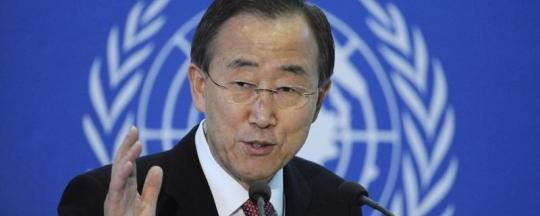United Nations Secretary-General Ban Ki-moon says there is a high risk of more mass killings in South Sudan and he is urging peacekeepers in the country to be on the lookout for “early warning signals and trends of persons at risk.”
In a new report to the UN Security Council, Ban Ki-moon further warns that the peace deal signed in August may not hold, citing the lack of seriousness shown by the two parties throughout the last few months.
“Breaches of the ceasefire and the failure of the parties to meet the initial deadlines articulated for the preparatory phase of the implementation of the peace agreement call into question their commitment to the peace process and their political buy-in with regard to implementation,” says the secretary-general in a new report circulated to press yesterday.
“The atrocities committed during the 20 months of conflict and general collapse of State authority in the greater Upper Nile region and some parts of the greater Equatoria and greater Bahr el-Ghazal regions imply that revenge killings and increased intercommunal violence will also be major risks during the transition period.”
Ban Ki-moon referred to “high levels of brutality that have characterized the violence throughout the crisis,” warning that this pattern could possibly continue, in particular if human rights perpetrators are not held accountable. The UN chief warned of a possible “large-scale loss of life” if the cycle of violence resumes.
Even if there is no return to full-scale war, the transitional period is likely to see delays in the implementation of the peace agreement relating to disputes over interpretations of the provisions, according to the UN chief. “The transitional institutions are likely to become a new political battleground… making it extremely difficult for democratic and governance reforms to be conducted and new institutional arrangements to be implemented effectively.”
Ban Ki-moon writes that President Salva Kiir’s recent decree creating 28 states has created fears among some smaller tribes.
“At the state level, the continued centralization of power around the Presidency during the transition and the continued mismanagement of state resources could lead to political alienation, stoke discontent and give rise to fragmentation. Already, Establishment Order No. 36/2015, for the creation of 28 states, is fuelling fears of marginalization among some minority constituencies and could trigger additional local conflicts during the transition.”
Ban highlights that the warring parties that signed the August peace deal “have engaged in deliberate and targeted killing of civilians and extrajudicial and other unlawful killings, arbitrary arrest and detention, enforced disappearances, ill treatment and torture… Civilians have been targeted on the basis of their ethnicity.”
In light of these concerns, Ban told the Security Council that it was difficult to define a long-term strategy for the UN Mission in South Sudan at this time. He recommended some steps for how UNMISS can support implementation of the peace agreement, but noted that these tentative recommendations “rely on the commitment and improved cooperation with the national authorities.”
Ban Ki-moon has recommended that human rights monitoring including regular public reports and identifying warning signs should be part of the new mandate of UNMISS.




